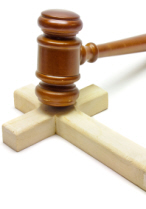Pray continue
- Details
 Last month the Local Government (Religious Observances) Act received Royal Assent. Graeme Creer looks at the latest development in relation to council prayers.
Last month the Local Government (Religious Observances) Act received Royal Assent. Graeme Creer looks at the latest development in relation to council prayers.
The municipal prayers saga has taken another turn. It generates strong feelings, and is very much a matter of conscience, but you might be tempted to think that it reads more like a Gilbert and Sullivan operetta than a sensible use of public money.
In Bideford, Devon, the Town Council held prayers as the first item of business of their meetings. This is quite common, but Mr Bone, a former councillor supported by the National Secular Society, challenged the practice. In February 2012 the High Court held that the council had no legal power to pray at its meetings. The council did not argue that, in their opinion, prayer would bring direct benefit to some of the inhabitants of the area, and in consequence that they were empowered to pray by section 137 of the Local Government Act 1972. They were unable to rely on the “well being” powers under the Local Government Act 2000, because they had not sought to become an “eligible parish council” for that purpose. Ouseley J held that they could not rely on section 111 of the Local Government Act 1972 because prayer was not “calculated to facilitate, or … conducive or incidental to, the discharge of any of their functions”, given that the link with the functions in question must not be too remote and that the council had not considered it essential for all its members to take part.
Communities and Local Government Secretary Eric Pickles swung into action. The Localism Act 2011 contains a “general power of competence” which gives local authorities the power to do “anything that individuals generally may do”, including praying. Mr Pickles fast-tracked the order bringing the new power into force. He said “As a matter of urgency I have personally signed a Parliamentary order to bring into force an important part of the new Localism Act - the general power of competence - that gives councils the vital legal standing that should allow them to continue to hold formal prayers at meetings where they wish to do so.”
Unfortunately, the new power was not available to all Town and Parish Councils. Like the well-being power, they can only exercise the general power of competence if they are “eligible”. This means that they must meet certain conditions (as to the proportion of their members that are directly elected, and the qualifications of the clerk to the council) prescribed in an order made by, as it happens, Mr Pickles. Neither is the power available to fire and rescue authorities, integrated transport authorities, combined authorities or a number of other bodies within the local authority family, although there is nothing to stop them holding prayers before the meeting starts, as Ouseley J pointed out, nor (Bideford apart) is there any evidence of a frustrated desire to pray during these bodies’ meetings.
Nevertheless, Jake Berry MP sponsored a Private Members Bill, with government support. This has just become the Local Government (Religious etc. Observances) Act 2015 and it will become law on 26 May 2015. It applies to a long list of English local authorities and the like, and their meetings and those of their committees, sub-committees, joint committees, and so on. The operative provisions simply say that the business of such meetings may include time for “prayers or other religious observance, or … observance connected with a religious or philosophical belief”.
They, and an even longer list of public bodies, are also authorised to “support or facilitate, or make arrangements to be represented at … a religious event, … an event with a religious element, … an event connected with a religious or philosophical belief, or an event with an element connected with such a belief.” And they may use their other powers to support or facilitate any such event.
The parliamentary debates included a certain amount of speculation about the impact of the Bideford case, but there is a distinct absence of any reports of public bodies feeling inhibited by the perception that they lacked legal power to participate in events of this kind.
The National Secularist Society lobbied against the Bill. Their campaigns officer said that it was about “a religiously privileged out of touch minority wishing to assert their dominance.” According to the Church Times, Mr Pickles said "there are a bunch of folks out there who just want to stamp out religion or any displays of religion. That seems to me to be a deeply bigoted and deeply illiberal attitude."
In France, there is a constitutional principle of secularism, the separation of the Church and the State. In England, there no such principle, and there is an established church, but a WIN/Gallup survey recently reported that only 30% of the UK population described themselves as religious. This is all a matter of opinion, and often of deeply held conviction. There are difficult doctrinal issues, not the least of which is to whom the prayers should be addressed. But how strange that this debate should surface as a wrangle about local authorities’ legal powers: a surrogate argument, not about whether councils, internal drainage boards and all the rest ought to pray during their meetings, but about whether they are legally competent to do so.
Graeme Creer is a consultant at Weightmans. He can be contacted on 0151 243 9834 or
Legal Director - Government and Public Sector
Governance Lawyer
Deputy Director Legal and Democratic Services
Regulatory/Litigation Lawyer
Legal Adviser
Locums
Poll

















